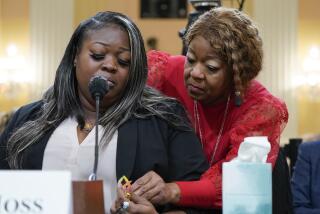O.C. Poll Guard Case Ends in Settlement by State GOP
Closing the final chapter of a landmark civil rights case, officials with the California Republican Party said a settlement was reached Monday with five Orange County plaintiffs who had accused the GOP of placing uniformed guards at polling places in 1988 to deter Latinos from voting.
The state Republican Party was the last of several defendants to reach a settlement in the so-called poll guard case, which triggered a revision of state election laws and brought national attention to Orange Countyâs treatment of civil rights.
As part of the agreement, both sides declined to reveal the amount of the settlement.
But since the civil suit was filed nearly four years ago, the plaintiffs and their attorneys have already received about $480,000 in settlements involving the Orange County Republican Party and former Assemblyman Curt Pringle (R-Garden Grove), whose 1988 campaign hired the guards.
âMany people told us that nobody did anything wrong, but thatâs not the way we took it,â Jose Vargas, one of the five plaintiffs, said Monday. âThe fact this cost them some money means that we were right.â
Peter J. Hinton, an attorney from Walnut Creek who represented the plaintiffs, also said there was a message in the settlement Monday.
âIt is that one of the leading democracies in the world is not going to condone Third Reich tactics to keep minorities from voting,â he said.
State Republican officials insisted, however, that the party did not violate any laws and that they were ready to take the case to trial, which was scheduled to begin in U.S. District Court in Los Angeles today. They said, however, that the decision to settle the case was made by an insurance company.
âThis was a business judgment by the insurance company,â said Lorelei Kinder, executive director for the state GOP. âThis was very definitely a very frivolous suit. It is a prime example of the problems in our legal system when you can start a frivolous claim against anyone and continue to pursue it. The state party had absolutely nothing to do with this.â
The other GOP defendants have also said their insurance companies made the decision not to contest the case, and they have denied wrongdoing.
The poll guard case stemmed from a decision by Pringleâs campaign to station private security guards at about 20 polling places in Santa Ana because of rumors that the Democratic Party was planning to bring unregistered or non-citizen voters into the district by bus.
The idea arose during a meeting with officials from Pringleâs campaign and the county Republican Party, which agreed to pay for the guards. The uniformed guards were placed in predominantly Latino neighborhoods of Santa Ana, holding signs that said in Spanish and English: âNon-Citizens Canât Vote.â
The five Latino plaintiffs charged that they were intimidated by the guards, a violation of federal civil rights laws. And the uproar that followed their suit led to an outcry for tougher laws to prevent voter intimidation.
Shortly after the incident, the state Legislature passed a law making it a felony to interfere with a voter. And in the election earlier this month, the U.S. Justice Dept. stationed representatives at Orange County polling places to monitor voting operations.
For more than two years after the incident, the Justice Department and the Orange County district attorneyâs office also investigated whether to file criminal charges against local Republican officials. The investigation was dropped in May, 1991, when authorities concluded there was insufficient evidence âof an intent to intimidate voters.â
Pringle narrowly won his first election over Democrat Christian Thierbach in the 1988 Assembly race that was marred by the poll guard incident. But two years later, in a campaign that focused on the incident, Pringle lost his seat to Democrat Tom Umberg.
This year, Pringle won election to a newly drawn Assembly seat, and Umberg was reelected to a second term.
The plaintiffâs case against the California Republican Party was pursued separately from other defendants because, at one point, a judge removed the the state party from liability. Attorneys for the plaintiffs appealed the judgeâs decision and won the right to pursue its case against the state party in July, 1991.
The state GOP contended that it was not involved in the decision to hire the poll guards. But plaintiffsâ attorneys argued that some of the individuals participating in the incident also were members of the state Republican Partyâs Central Committee.
Hinton said two of the state Republican Partyâs officers who participated in the decision to hire the guards were attorney William Godfrey and then-Assemblyman John Lewis (R-Orange), who now serves in the state Senate.
Hinton said the terms of the settlement were limited to a dismissal of the case and an agreement that the financial arrangement not be disclosed. He said the money would be used to pay attorney fees and the remainder would be divided among the plaintiffs.
Plaintiff Vargas also declined to reveal the terms of the settlement, but he said it was ânot a very big amount.â
âItâs been so long,â Vargas said. âI donât think we have won something; I think the people of the state of California have won something.â
More to Read
Sign up for Essential California
The most important California stories and recommendations in your inbox every morning.
You may occasionally receive promotional content from the Los Angeles Times.









